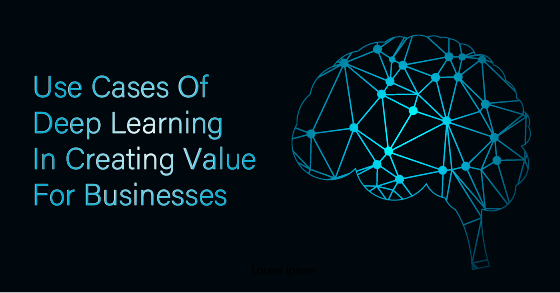"Importance Of Ecommerce Software In Businesses"
"4 Reasons Why Businesses Opting To Migrate To The Cloud"

The potential to recognize and use data insights to strategize services, solutions, and the shopping experience as a whole is significantly critical in this data-centric world. Today’s leading organizations are adopting deep learning to analyze documents and images connected to a large database, identify speech or gestures, translate voice in real time, predictions with past information, and more.
Deep learning is a subset of machine learning making use of algorithms with speech, images and text in a more effective and efficient fashion to recognize, identify and understand patterns in the data as like human brain performs. For instance, Apple, Google, and Microsoft make use of deep learning in their image and speech recognition algorithms, while Netflix and Amazon utilize it for analyzing and influencing consumer decision making. Prepare your business’s future by taking a look at some revolutionary use cases of deep learning:
Deep learning is treated as the most significant breakthrough in the field of pattern recognition. Deep learning allows organizations to monitor and process a multitude of things like, information on what are the trends in the marketplace, how many times users contact customer service, and how long do they engage on a given App/website, to create an insightful narrative about shopping habits and preferences to use across the business.
In addition, patterns can also be used in direct marketing, for instance, to conduct studies about market trends, customer preferences, behavioral data, and surveys to understand the usual purchasing path for highest-value segments. By combining rich customer profiles and tracking response rates, organizations can personalize outreach based on what type of content over what channel and format customers are likely to have for greater market impact.
For instance, PayPal along with an open-source predictive analytics platform, H2O make use of deep learning to stop fraudulent payment transactions or purchases. Another example is Enlitic, which uses deep learning to process MRIs, X-rays, and other medical images to help health professionals to diagnose and treat various diseases. Deep learning networks also offer rich insights in terms of early-stage disease detection, treatment planning, and monitoring.
Deep learning is completely reshaping life sciences, medicine, and healthcare as an industry by combining the data from various sources. Innovations in deep learning advances the drug discovery in such a way to predict novel small biomolecules for several diseases like Ebola virus or discover new kinds of medicine in unbelievable ways.
For instance, Bay Labs - a healthcare startup combines deep learning cardiovascular imaging to help in the diagnosis and management of cardiac disease. With the help of deep learning, Bay Labs has the capability to quickly influence cardiovascular disease, the leading cause of death, by providing high-quality cardiac imaging results to improve patient care.
In addition, computer-aided detection, quantitative imaging, decision support tools and computer-aided diagnosis will play a big role in the coming years. An AI start-up, Atomwise uses deep learning algorithms to solve the problem of drug discovery. Deep learning can also use to discover new medicines, as well as explore the chances of repurposing known and tested drugs for use against new diseases.
Deep learning in cybersecurity allows the companies to reduce risks and expenses related to detecting threats. It deals efficiently with cyber-attacks to detect fraud, phishing, malware, malicious URL, and malicious code detection. Its self-taught algorithms recognize user activities using past data, to quickly spot and protect against a suspicious activity which might put valuable data at risk and act to isolate them.
Deep learning can automate intrusion detection for 24 hours a day, seven days a week, without depletion in impressive accuracy. It also has a wide use case in the areas of defense against service disruptions, attribution and user behavior modification.
Deep learning is transforming many industries including healthcare, fintech, edtech, transportation, etc to reimagine end-to-end business processes with digital intelligence. They have a profound effect on the workplace and great potential in terms of developing autonomous self-taught deep learning applications, which can be used for forecasting results, detecting fraud, attracting new customers, and a lot more. However, the capabilities are enormous, that’s why enterprises invest greatly in deep learning for their existing applications as well as to develop new solutions.